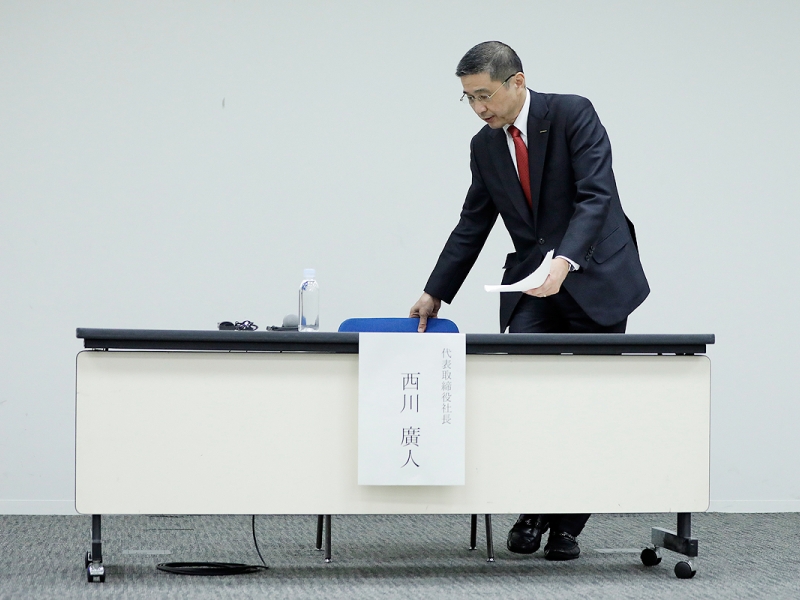
TOKYO — Nissan Motor Co. will split chairman duties among its executives, putting the brakes on naming a successor to Carlos Ghosn as the pay scandal that landed the high-flying executive in a Tokyo jail widens to include the automaker itself.
The board met Monday to decide on a successor for Ghosn, who was ousted as chairman the same week he was arrested on allegations of understating his pay and misusing Nissan’s assets. Instead, directors appointed a committee to look into governance at the automaker, which was indicted along with Ghosn by Japanese prosecutors last week.
The Nissan board may wait for the committee’s comments before naming a new chairman, CEO Hiroto Saikawa told reporters Monday. The committee will give its recommendations by March 2019, almost four months after the Nov. 19 jailing of Ghosn and his hasty ouster as Nissan’s chairman three days later.
The delay stands in contrast to Nissan’s conduct immediately after Ghosn’s arrest, when Saikawa convened a press conference the same evening to angrily condemn his former mentor’s actions. It also comes as the carmaker faces increasing pressure from Renault SA, its largest shareholder and partner in the world’s biggest auto alliance.
Meantime, Renault, whose most powerful shareholder is the French state, is considering candidates to replace Ghosn as its chairman, but the board isn’t ready to remove him, said a person familiar with the matter.
One possibility is Michelin CEO Jean-Dominique Senard, said the person, who asked not to be identified because the deliberations are private. Ghosn is likely to remain chairman until he’s had a chance to publicly defend himself, although this timing could change, the person said. Interim CEO Thierry Bollore is likely to take on the role permanently, people familiar with the matter have said.
Renault technically kept Ghosn on as chairman and CEO while it seeks more information and evidence about the accusations. In a sign of a deepening divide between the partners, Renault is pushing Nissan to call a shareholder meeting as soon as possible to discuss the Japanese automaker’s indictment, governance and the French company’s appointees on Nissan’s board, people familiar with the matter have said.
Ghosn, 64, was arrested in Tokyo for alleged understatement of his income, and on Dec. 10 he and Nissan were indicted by Japanese prosecutors over the suspected misconduct. The company’s indictment has expanded the scrutiny beyond Ghosn and raised questions about its corporate governance. It also cast attention on the leadership of Saikawa, so much so that his job may be on the line, according to analysts and people familiar with the situation inside the company.
Addressing Renault
Saikawa called on directors at Renault to heed Nissan’s reasons for sacking Ghosn, who has denied wrongdoing although he has not made any public statements since his arrest.
“We hope the board will listen to our explanation,” Saikawa told reporters during the press conference.
Although sources familiar with the matter say Nissan has briefed Renault lawyers on its findings relating to Ghosn’s alleged misconduct, Renault directors have yet to be given access to the full information.
“We understand that the raw details of the misconduct have yet to reach each of Renault’s board members,” Saikawa said of the allegations against Nissan’s once-revered boss.
Nissan, meanwhile, has long been unhappy about what it considers an outsized French role in the partnership, and is seeking to redress perceived imbalances, people familiar with the matter have said. Officially, Nissan has said it is committed to the partnership and on Monday it pledged to keep its alliance partners fully informed.
Nissan conducted a months-long probe into Ghosn’s financial reporting and alleged misuse of company assets. A former Ghosn protege, Saikawa has been Nissan’s CEO since last year and has emerged as a driving force in the investigation.
Timing of probe
The timing of the company’s probe prompted some analysts to say the scandal may have been manufactured in order to block a merger that Ghosn was advocating between Nissan and Renault. Saikawa has denied that such a motive was behind the investigation.
Still, Saikawa and other Japanese executives within Nissan have spoken strongly against a merger. A Nissan lifer who was elevated to CEO when Ghosn stepped back from the role last year, Saikawa has a reputation as a fierce defender of Nissan’s interests within its dealings with Renault.
Renault appeared to have been blindsided by Ghosn’s arrest and the allegations that have drifted out. Its executives are suspicious of Nissan’s motives, demanding to see proof from the Japanese carmaker of the accusations against Ghosn, people familiar with the matter have said.
Renault and Nissan have complicated cross-shareholdings, and poor relations would make operations difficult. The French carmaker is the largest shareholder in Nissan and has voting rights, while the Japanese company is the second-largest shareholder in Renault, with no votes.
Reuters contributed to this report.
Be the first to comment